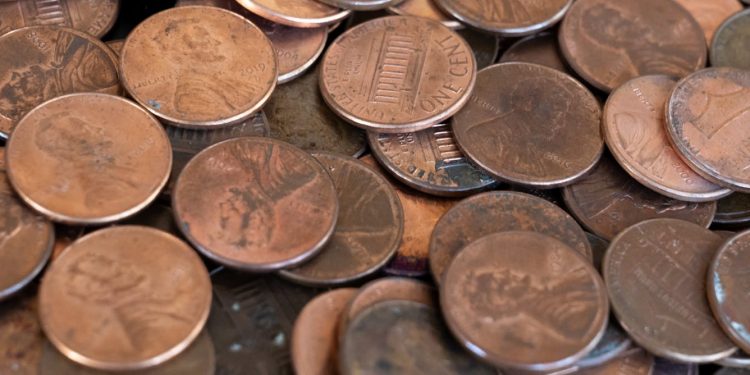In the middle of Super Bowl LIX, President Donald Trump posted on social media that he was getting rid of the penny. Since the lowly penny in 2024 cost about 3.7 cents to make – meaning the government loses money on every coin – the announcement might seem practical at first glance. But does the president have the power to kill off the penny?
I’m a business school professor and a longtime advocate for physical money who has written op-eds supporting the penny in The Wall Street Journal and CNN. My forthcoming book, “The Power of Cash,” explores the many advantages of using old-fashioned currency. Yet inflation has slashed the value of the penny by a third in just the past decade, and even I now admit that its time is up.
But eliminating the penny via a social media post isn’t just legally dubious. It could cause more problems than it solves.
The penny problem
Critics see the penny as a shining example of government waste. Last year, the U.S. Mint lost US$85 million making pennies, according to the bureau’s annual report. It also lost about $18 million minting nickels. Now, to be clear, just because the mint didn’t make money on pennies or nickels doesn’t mean it’s losing money overall. In 2024, the mint earned a profit of about $100 million making the country’s pocket change. Still, $85 million is no small sum.
Meanwhile, public opinion on the penny is split. Some surveys show support for it, but it has plenty of opponents. Many of my students cite carrying around “nuisance coins” like the penny as a reason for switching away from using cash.
The good news, for those who dislike the penny, is that the coin is disappearing on its own. The U.S. Mint has made about 5 billion pennies annually throughout the 2020s — down from about 11 billion each year in the 1990s. So far in 2025, it has only made about a quarter of a million pennies.
But is it legal?
Setting aside people’s feelings toward the penny, the problem with the president’s order, I think, is that only Congress can change the type of coins the mint produces.
To be fair, some defenders of the president’s order believe his actions are legal. But the U.S. Constitution’s Article 1, Section 8 – which gives Congress the power to do important things like levy taxes, pay debts and declare war – also authorizes Congress “to coin money.”
Now the phrase “to coin money” is vague. To fix that, the United States’ second Congress passed the Coinage Act of 1792, which was signed into law by President George Washington. The act, which lays out how the mint operates and what it produces, says it must produce “Cents – each to be of the value of the one hundredth part of a dollar, and to contain eleven penny-weights of copper.”
Congress can modify this act anytime it wants – and it has. The 1792 act also required the mint to produce “Half Cents – each to be of the value of half a cent.” These coins were eliminated in 1857 by an act of Congress. Similarly, before 1965, many U.S. coins were made out of silver. After a 1965 congressional amendment to the act passed, they were made out of a cheaper composite.
And lawmakers have tried several times to eliminate the penny. In 1989, for example, Arizona Rep. Jim Hayes proposed the Price Rounding Act, which called for cash purchases to be rounded to the nearest nickel. It didn’t pass. More recently, in 2017, Republican Senator John McCain introduced the COINS act, which would have eliminated the minting of pennies. The bill also proposed switching the paper one-dollar bill to a metal coin. It, too, didn’t pass.
What happens if pennies go?
Since Congress has failed to eliminate the penny in the past, Trump is trying to do so via a direct order to the Treasury secretary. However, many of Trump’s actions are being challenged in court. For the sake of argument, let’s assume no one challenges the order to kill off production of the penny.
A big problem remains. Even if the U.S. stopped making pennies, they’d remain legal tender and people would still need them as change. In simple terms, the supply would change, but not the demand.
Past efforts to phase out the penny have tried to deal with this problem by requiring rounding, but Trump’s effort doesn’t do this. I think it’s entirely possible that people opposed to Trump would organize national “Demand your penny in change” days in an attempt to embarrass the president.
The U.S. government loses less than $10 million a month minting pennies. In theory, Congress could pass legislation eliminating the penny and requiring rounding within a month or two. The cost to the government for doing things legally is low. If the penny has to go, let Congress do it the right way.
![]()
Jay L. Zagorsky does not work for, consult, own shares in or receive funding from any company or organization that would benefit from this article, and has disclosed no relevant affiliations beyond their academic appointment.
















